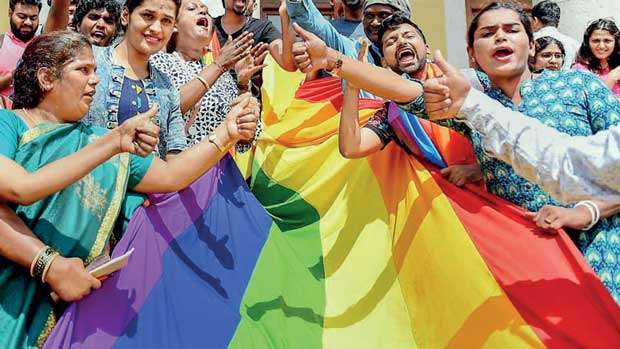Reply To:
Name - Reply Comment
Last Updated : 2024-04-19 22:36:00

LGBT activists celebrate after Indian Supreme court delivered a verdict in favour of gay rights
 Last week, India’s Supreme Court decriminalized homosexuality, finally burying for good an archaic colonial era law that imposed a maximum penalty of life imprisonment for consensual gay sex. The Judges described the Section 377 of the Penal Code, that was first introduced in 1861 as“irrational, indefensible and manifestly arbitrary.” Rather than just scrapping the old law, the Supreme Court went further, granting the LGBTQ members the guarantees of equal protection under the constitution.One member of the five Judge bench said the society owed a collective apology to LGBTQ community for the prolonged denial of their due rights.
Last week, India’s Supreme Court decriminalized homosexuality, finally burying for good an archaic colonial era law that imposed a maximum penalty of life imprisonment for consensual gay sex. The Judges described the Section 377 of the Penal Code, that was first introduced in 1861 as“irrational, indefensible and manifestly arbitrary.” Rather than just scrapping the old law, the Supreme Court went further, granting the LGBTQ members the guarantees of equal protection under the constitution.One member of the five Judge bench said the society owed a collective apology to LGBTQ community for the prolonged denial of their due rights.
That was a landmark judgement. Given the scale of India, this is also by far the biggest victory for gay rights anywhere in the world in recent times. Indian triumph has also created a historic opportunity for her neighbours and has set a judicial precedent for their less activist courts. Sri Lankan civil society and liberal law makers should grab this opportunity, before enthusiasm and public empathy fade away.
India’s long battle for gay rights offers both inspiration and a snippet of myriad hurdles that laid on its way. The Section 377 implanted from the Victorian England penalized anyone who “voluntarily has carnal intercourse against the order of nature with any man, woman or animal.” When India emerged as an independent state, India’s new rulers were overly eager to sever the appendage to their colonial history. But they kept the vestige colonial law, perhaps an understandable decision in an overwhelming conservative society, and a world beset by homophobia. Still, India’s choice was a mismatch to Nehru’s loftier goals of social justice. ( Much later in the 50s, the British courts hounded Alan Turing, a pioneering computer scientist and World War II code breaker, for being homosexual, and had him chemically castrated, leading him to commit suicide.)
However, in the 60s and 70s much of the Europe and later America went through a sexual revolution and came to terms with the variance of sexual orientation. Since then, the world, at least a part of it, has come a long way, leaving behind overt homophobia that provoked Stonewall riots to a place that is increasingly accepting of same sex marriages.
Newly independent countries of Asia and Africa lagged in this process. Due to existential reasons, their societies failed to harness individual rights. Their misplaced statist and pseudo socialist economic models stifled economic development, the primary driver of empowerment of the citizenry. Urbanization, another long term driver of individual freedoms was absent or marred by a sea of slums.
In their unholy rush for popular empowerment, those countries put the cart before the horse. By overstating the perceived merits of the political empowerment of a populace who had been living hand to mouth off the government food rations, their political leaders effectively created a large captive electorate of poor, the semi-literate and despondent. In these skewed societies, conservative majoritarian morality espoused by the religious and cast elites dictated the social discourse. Politicians neither had courage, nor desire to challenge it. They feed on it. In effect, path ways of political empowerment effectively handicapped economic and social freedoms. If gay rights were a yard stick of social freedoms, which it is, Communist China decriminalized homosexuality as way back in 1997. Mandarins of Beijing had little to worry about the purists and religious leaders standing on their way.
India however was special. Amidst the depravity of its swarming masses, the British left behind, and the independent leaders largely left untouched, a set of strong independent institutions, judiciary being perhaps the most activist and standard-setting one of all. It fell regularly upon the courts to upend this skewed status quo, and uphold social justice.
India’s first petition against the Section 377 was submitted in the 1980s. In 2009, the Delhi High Court decriminalized homosexuality. Religious groups challenged the ruling in the Supreme Court which in 2013 set aside the High Court judgement, and ruled that the decision to decriminalize homosexuality should be a matter of Parliament. Subsequently in 2015, India’s Lok Sabha voted against a private member Bill by Congress MP Sashi Tharoor to decriminalize homosexuality. However, in 2016, India’s Supreme Court decided to review all pleas against the Section 377 and named a five-member bench Constitutional Court, which last week stuck off the book the colonial era law.
Announcing the ruling, the Chief Justice Dipak Misra observed that the majoritarian view of ‘social morality cannot violate the rights of even one single individual.’
Interestingly, the triumph of India’s long battle for gay rights happened under the Hindu nationalist BJP, of which number of key functionaries are known to be not just bigots, but also homophobes. Chief Justice Misra himself was under a cloud, and was publicly criticized for being overly pro-establishment by a group of fellow Judges, who last year held a rare press conference to warn that the independence of judiciary is under pressure. By striking off one and a half century old unjust law, the Justice might have reclaimed his stature.
Just like India’s vestige law, Article 365A of Sri Lanka’s Penal Code prohibits anyone, irrespective of gender, from engaging in “gross indecency”. Like in India, the law had not actively been enforced, and no conviction has been obtained. However, in both countries, this discriminatory law has provided pretext for rogue cops and bigots to harass LGBTQ people. Similarly, it discourages companies from employing gay people, and creates room for workplace discrimination. Social stigmatization aggravated by discriminatory laws prevents the victims from seeking legal help.
Sri Lanka has sent mixed signals over the civil society’s calls for decriminalizing of homosexuality. In October, 2014, the then Rajapaksa administration assured the United Nations Human Rights Commission that sexual minorities were already protected under existing anti-discrimination laws provided in the Constitution. In November 2016, Sri Lanka voted against a plan to abolish the UN Independent Expert on violence and discrimination based on sexual orientation and gender identity. Last year, the government also updated its national human rights plan with a pledge to prohibit discrimination based on sexual orientation.
However, the political will has been in short supply. Ignorance and politically calculated puritanism have not helped the cause. Last year, the Cabinet of Ministers rebuffed a proposal to decriminalize homosexuality. President Maithripala Sirisena led the charge against the proposal. More liberally inclined ones such as Prime minister Ranil Wickremesinghe and Mangala Samaraweera do not seem to have guts to ride the roughshod.
All of that leads the progressive folks to pin their hopes on the judiciary. After all,the idea of independent institutions is, as much as upholding checks and balances, is also about being a beacon of reason in societies mired in ignorance.
The victory of Indian campaign has cleared the path of many hurdles for their Sri Lankan counterparts. Indian Supreme Court ruling should set a judicial precedent that Sri Lankan Judges, who may otherwise shy away due to conservative pressure, would find as helpful. Media exposure to Indian judgment would also generate awareness among public. Also, though gutless to act on its own to decriminalize homosexuality, the current government is unlikely to stand on the way of a progressive ruling by the Supreme Court, like its predecessor could probably have done. As far as the judiciary is concerned, this offers an opportunity to prove that it has come a long way since the gory days of the former regime when the judges, a quite a few of them, were pet poodles of the then first family.
Sri Lanka’s LGBTQ activists, civil society and professional organizations should make use of this opening and challenge the archaic discriminatory law in the court. They have a very strong chance of success.
Follow @RangaJayasuriya on Twitter

Add comment
Comments will be edited (grammar, spelling and slang) and authorized at the discretion of Daily Mirror online. The website also has the right not to publish selected comments.
Reply To:
Name - Reply Comment
On March 26, a couple arriving from Thailand was arrested with 88 live animal
According to villagers from Naula-Moragolla out of 105 families 80 can afford
Is the situation in Sri Lanka so grim that locals harbour hope that they coul
A recent post on social media revealed that three purple-faced langurs near t